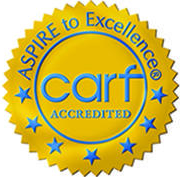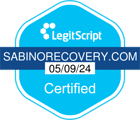Evidence-Based Therapy Modalities for Addiction And Mental Health
If you are suffering from a mental health disorder, drug or alcohol addiction, or battling both co-occurring disorders, it is crucial to apply evidence-based practices to ensure the most effective treatment.
At Sabino Recovery, we offer a trauma-centered approach to treatment that integrates both naturopathic and allopathic medicine with evidence-based modalities. Upon admission, each resident receives an in-depth assessment. This thorough evaluation process provides us with your unique history so we can tailor an evidence-based treatment plan to fit your unique needs.
By addressing underlying trauma and providing holistic care, we ensure that you have the right tools to overcome any obstacles and find mental and physical well-being. Don’t wait. Call Sabino Recovery today!

Is Addiction Impacting Your Life?
Take The First Step To True Healing Today!
What is the Significance of Evidence-Based Practices?
Evidence-based practices (EBPs) are essential in the field of mental health and addiction. They provide a scientific framework for evaluating the effectiveness of various treatments, ensuring that you receive the best possible care. Utilizing EBPs in clinical decision-making helps to improve treatment outcomes and reduce the risk of ineffective therapies.
When it comes to talk therapy, evidence-based approaches guarantee the application of methods backed by rigorous research. This translates to proven efficacy in addressing mental health and addiction issues. Treatment efficacy is a crucial aspect of EBPs, as it demonstrates the success of a specific therapy in enhancing patients’ well-being.
Evidence-Based Modalities for Mental Health Disorders
There is a variety of evidence-based mental health services and treatment methods designed to help those struggling with mental illnesses. Some of the more common modalities are:
Individual therapy is a one-on-one mental health service a therapist or psychologist provides to address various mental disorders such as bipolar disorder, depression, anxiety, or trauma. At Sabino Recovery, you receive 35 individual therapy sessions in just 35 days. These sessions can be tailored to your specific needs and preferences, drawing from clinical expertise to determine the most effective approach. In individual therapy, you will develop a trusting relationship with your therapist, allowing for a safe space to explore thoughts, feelings, and behaviors.
Group counseling is an evidence-based modality that involves a small group of individuals with similar mental health issues coming together for support and healing. At Sabino Recovery, these groups are kept small, with no more than 8 participants in a group. They are led by a trained mental health professional and provide collaboration and discussion to help participants develop new skills, coping mechanisms, and insights. Support groups can be particularly helpful for enhancing distress tolerance and emotion regulation.
Family therapy is a therapeutic method that addresses the dynamics within a family system as it relates to mental health disorders. At Sabino Recovery, we host a 3.5-day intensive family program at our campus. Our family program is led by a designated family therapist and is an interactive program in which family members participate in sessions with a mental health professional to better understand and support one another. The goal is to improve communication, resolve conflicts, and strengthen relationships.
Cognitive-behavioral therapy (CBT) is a widely used evidence-based approach for treating mental disorders. It involves the identification and restructuring of maladaptive thoughts, beliefs, and behaviors in order to alleviate distress and improve overall well-being. CBT can be highly effective in treating conditions such as depression, anxiety, and trauma, among others.
Dialectical behavior therapy (DBT) is a type of cognitive-behavioral therapy specifically designed for individuals with borderline personality disorder but has also been proven effective for other mental health conditions. DBT focuses on the development of four primary skills: mindfulness, distress tolerance, emotion regulation, and interpersonal effectiveness. This therapy incorporates both individual sessions and group skills training to provide comprehensive support.
Eye movement desensitization and reprocessing (EMDR) is an evidence-based psychotherapy for resolving the emotional distress caused by traumatic experiences. EMDR involves the use of bilateral stimulation, such as eye movements or tapping, to process and reframe traumatic memories. This therapy is particularly effective for those suffering from post-traumatic stress disorder (PTSD) and trauma.
Neurofeedback is a non-invasive, evidence-based therapy that uses real-time monitoring of brain activity to help individuals regulate their own brain function. By providing feedback on your brainwave patterns, neurofeedback can help you learn to shift the way your brain processes information, improving mental health symptoms related to attention, mood, and anxiety.
Experiential therapy is an umbrella term for various forms of therapy that involve interactive, hands-on experiences to promote emotional healing. Examples include animal-assisted therapies, such as equine therapy, or expressive arts therapies. These evidence-based methods can be particularly beneficial for individuals who struggle to articulate their thoughts and feelings verbally, as they utilize alternative means of communication and self-expression.
Our Evidence-Based Modalities for Mental Health Treatment
- Accelerated Resolution Therapy
- Internal Family Systems Therapy
- Mindfulness-Based CBT (MCBT)
- Meditation
- Equine Therapy
- Neurotherapy
Contact Our Admissions Team Today
Benefits of Evidence-Based Therapies
Some of the benefits of employing evidence-based treatments include:
- Greater efficacy: You can trust that these methods have been validated in numerous studies and practical applications, increasing the likelihood of successful treatment.
- Consistency: Providers follow standardized protocols, ensuring that you receive a consistent level of care, regardless of the practitioner or facility.
- Continual improvement: As new research is conducted, treatments are refined and adapted, keeping you on the cutting edge of effective care.
- Personalization: Tailored to your specific needs, evidence-based treatments take into account individual preferences, goals, and circumstances, making the approach highly relevant to your recovery journey.
By leveraging evidence-based treatments, you can maximize the possibility of overcoming your mental health and alcohol or drug abuse challenges.

Nationally Recognized & Accredited




Testimonials
![]()
![]()
![]()
![]()
![]()
Regina
I am so happy that I chose Sabino to begin my recovery. I have suffered for years from depression, anxiety, panic disorder, and PTSD. The programs that are offered here at Sabino have been truly phenomenal in helping me recover. I also appreciated the professional staff that are here on duty 24/7, which helps create a safe environment. Sabino Recovery uses effective “one on one” methods that meet each person’s individual needs because they evaluate and have a better understanding of your personal traumatic experiences. Thanks Sabino, I am truly grateful to you and the Sabino family.
![]()
![]()
![]()
![]()
![]()
J.A.
A beautiful facility! Staff sets the tone and kindness that residents easily follow. Thank you, Sabino Recovery!
![]()
![]()
![]()
![]()
![]()
Pamela
The program at Sabino Recovery works! I emerged from an accumulation of unrecognized emotions, issues of trust, and unresolved grief and loss. 35-days of effective integration of customized quality therapy reconnected my mind, body, spirit, and I am worth it! I had masked emotions and hurtful events for decades with alcohol. At Sabino Recovery I safely focused deep within to unleash harmful secrets and self-degradation. Tools of recovery were practiced, not just presented. Integrative therapies were tailored to my circumstances, thus were effective. This residential program is like no other. For me, Sabino Recovery delivered what was professed. I am forever grateful for this gift of healing.
![]()
![]()
![]()
![]()
![]()
Mike
Life changing experience. Wonderful staff. Wonderful program. Thanks for everything!
![]()
![]()
![]()
![]()
![]()
Darcy
It was great to begin my recovery in a group environment with so many knowledgeable nurses, therapists, BHT’s, and others around for support. The equine therapy, challenge course, family week, and daily therapies all work together seamlessly, allowing me to leave Sabino as a healthier and stronger person!
Evidence-Based Treatment Modalities for Substance Abuse Treatment in Tucson, AZ
Evidence-based modalities that are beneficial to those with a mental illness can also be used to treat addiction. While the focus may be different, these proven modalities have been shown to reduce alcohol consumption and improve things like opioid use disorders when incorporated into addiction treatment programs.
Individual Therapy
Individual therapy is a key component in the treatment of addiction. With 50 1:1 sessions in just 35 days, we are able to address your specific needs. This approach helps you understand the underlying causes of your substance use disorder and provides a safe space for exploring feelings and emotions associated with addiction. Methods commonly used include motivational interviewing, which aims to enhance your motivation to change and embrace recovery, and cognitive-behavioral therapy (CBT), which focuses on identifying and modifying negative thought patterns and behaviors.
Group Therapy
Group therapy is an essential aspect of the recovery process, as it promotes social support and accountability. Participating in this type of therapy helps you establish healthy relationships with others who are also in recovery. In our small group sessions, with no more than 8 participants, you will explore common themes associated with addiction, share your experiences, and learn strategies for coping and relapse prevention.
Family Therapy
Family therapy is also an integral part of addiction treatment, as it works to heal the relationships affected by substance use disorders. Our family program is held in person once a week and aids in improving communication and creating a support system for you and your family members. By involving your loved ones in the process, they can gain a better understanding of the challenges you face and learn how to best support your recovery.
CBT
Cognitive-behavioral therapy (CBT) is a widely used evidence-based approach aimed at helping you develop effective strategies to manage thoughts, emotions, and behaviors tied to addiction. With CBT, you’ll learn how to identify and change negative thought patterns that contribute to substance use and replace them with healthier alternatives, thus reducing the likelihood of relapse.
DBT
Dialectical behavior therapy (DBT) is another evidence-based practice that combines cognitive and behavioral techniques with mindfulness and acceptance practices. DBT helps you establish emotional regulation, improve interpersonal relationships, and tolerate distress. This modality has been proven effective in treating individuals with co-occurring substance use disorders and emotional dysregulation, such as borderline personality disorder.
EMDR
Eye movement desensitization and reprocessing (EMDR) is a specialized therapeutic approach that has been shown to be effective in treating trauma-related disorders, which often coexist with addiction. EMDR focuses on processing and integrating distressing memories, reducing their impact on your life, and alleviating symptoms. By helping you address and heal trauma, EMDR can support you in overcoming addiction.
Neurofeedback
Neurofeedback is a non-invasive treatment that uses real-time displays of brain activity to teach you how to self-regulate your own brain function. This modality can help you gain control over cravings and reduce withdrawal symptoms, improving your ability to maintain sobriety. Some studies suggest that neurofeedback is an effective complementary tool in addiction treatment, promoting abstinence and preventing relapse.
Experiential Therapy
Experiential therapy is a creative approach to substance abuse treatment, encouraging you to engage in activities that help you express feelings and emotions. Types of experiential therapies include art therapy, music therapy, equine therapy, and adventure therapy. These activities provide an opportunity to gain insights, develop self-awareness, and practice new coping skills in a supportive environment.
Relapse Prevention
Relapse prevention is a crucial part of the recovery process, as it focuses on providing you with the skills and resources necessary to maintain long-term sobriety. This includes recognizing triggers, developing healthy coping techniques, and creating a strong support network. Techniques such as CBT, contingency management, and motivational interviewing are frequently incorporated into relapse prevention strategies to support you in maintaining your sobriety.
Our Evidence-Based Treatment For Addiction
Begin Your Healing Journey at Sabino Recovery Today
If you or a loved one is struggling with drug and alcohol use disorders or mental illness, consider seeking help at Sabino Recovery. Our experienced and compassionate staff utilize evidence-based practices tailored to each individual’s unique needs to ensure the most effective treatment.
At Sabino Recovery, we understand that addiction and mental health issues are sometimes intertwined, and our holistic approach can address each issue separately or both components concurrently. No matter your circumstances, our facility offers a safe, serene environment allowing you to focus on your healing journey.
Don’t let substance abuse or mental health issues dictate your life any longer. Contact Sabino Recovery today and embark on a transformative journey toward a healthier, more fulfilling life.




